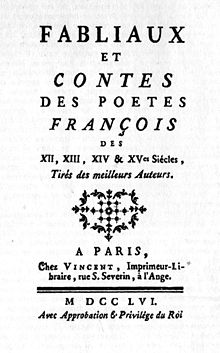Fabliau
A Fabliau (also Fablel ) is a medieval French farce narrative in verse, of minstrels ( juggler ) in satirical presented intention.
The mostly anonymous pieces came into fashion in northeastern France in the 13th century. Fabliaux very often had a lewd act, flaunting horned husbands, greedy clergymen and stupid country folk. The portrayal of the rural population seems to depend on the target group for which the Fabliau was written. Pieces presumably intended for the nobility showed the country folk ( vilains ) stupid and mean, while pieces written for the lower classes often told how it prevailed against the clergy.
Longer medieval poems, such as the story of Reineke Fuchs ( Le Roman de Renart ) and the Canterbury Tales by Geoffrey Chaucer, have their origins in one or more Fabliaux. Depending on how narrow the term is used, 150 of these pieces have come down to us. Their importance began to wane at the beginning of the 16th century. They were replaced by short prose stories. Her influence on French literature, especially Molière , Jean de La Fontaine and Voltaire, is still felt today.
Examples
- “L'enfant de neige” ( The Snow Child ) is a story of remarkably black humor . A trader returns home after a two-year absence and finds his wife with a newborn son. She explains to him that on a snowy day she swallowed a snowflake while she was thinking of her husband and that she became pregnant. Both pretend to believe in the miracle and raise the boy up to the age of 15. Then the father takes him on a trade trip to Genoa , where he sells him into slavery . When asked by his wife, he explains to her that the Italian sun has burned bright and hot and that the son conceived by a snowflake has melted in the heat.
- "La vielle gui graissa la patte de chevalier" ( The old woman who smeared the knight's hand )
- "Estula"
- "Le Pauvre Clerc" ( The Poor Clerk )
- "La Couverture partagée" ( The shared hiding place )
- "Le Prêtre qui mangea les mûres" ( The priest who ate mulberries )
- "Le Chevalier qui fit les cons parler" ( The knight who let the pussies speak )
- Rustebeuf (* before 1250, † around 1285), a French poet and forerunner François Villons wrote, among others, Fabliaux.
expenditure
- Robert Hellman: Fabliaux. Ribald Tales from the Old French . Greenwood Press, Westport, Con. 1976, ISBN 0-8371-7414-7 (English translation by 21 Fabliaux; reprint of the New York edition 1965).
- Ingrid Strasser (Ed.): Of love and blows. Old French stories. 16 Fabliaux (Fabulæ mediævales; Vol. 4). Böhlau Verlag, Cologne 1984, ISBN 3-205-06520-4 (translated by the editor).
- Elisabeth Blum (ed.): Fabliaux. Erotic stories from the Middle Ages . Wieser Verlag, Klagenfurt 2004, ISBN 3-85129-482-3 (translated by the editor).
literature
- Frauke Frosch-Freiburg: Schwankmären and Fabliaux. A comparison of fabrics and motifs . Kümmerle Verlag, Göppingen 1971, ISBN 3-87452-095-1 .
- Klaus Grubmüller: The order, the wit and the chaos. A History of European Novellistics in the Middle Ages. Fabliau, mare, novella . Niemeyer Verlag, Tübingen 2006, ISBN 978-3-484-64029-0 .
- Hans-Dieter Merl: Investigations into the structure, style and syntax in the Fabliaux Jean Bodels . Publishing house Peter Lang, Frankfurt a. M. 1972, ISBN 3-261-00730-3 .
- Roy J. Percy: Logic and humor in the fabliaux. An essay in applied narratology . Brewer Press, Cambridge 2007, ISBN 978-1-84384-122-7 .
- Ingrid Strasser: Pre-novellistic storytelling. Middle High German mars up to the middle of the 14th century and old French fabliaux . Verlag Fassbaender, Vienna 1989, ISBN 3-900538-15-8 .
- Wolfgang Spiewok (ed.): Old German Decameron . Rütten & Loening, Berlin 1989, ISBN 3-352-00268-1 , p. 739
Web links
- The Fabliaux (part of a page about Geoffrey Chaucer).
- Peter Vandendriessche: La transmission du savoir dans les fabliaux français au moyen age . 2005 (analysis of the “fabliau” phenomenon; in French).
- Fabliaux handwriting from the Bern Burger Library on e-Codices
- Description of the manuscript (Cod. 354) in the catalog of the Burgerbibliothek Bern
